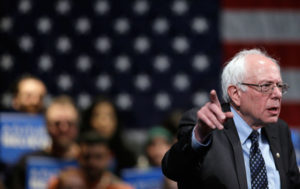Why It’s Imperative That We Hear Michigan’s Angry Voices
The Rust Belt state's primary outcome -- victories by Bernie Sanders and Donald Trump -- was brought to you by white working-class men and the people from little towns and small cities. Kate Ter Haar / CC BY 2.0
Kate Ter Haar / CC BY 2.0
Last Tuesday in Michigan was brought to you by white working-class men and the people from little towns and small cities. The outcome of a primary that shook the certainties in the Democratic presidential race while also ratifying the ongoing power of Donald Trump’s coalition of discontent was determined by voters who don’t trust trade deals and don’t believe in the promises of the new economy.
Trump and Bernie Sanders are as different as two politicians can be, yet both served as megaphones for a loud cry of protest from the long-suffering and the ignored.
This year’s primaries can be seen as the end of 1980s conservatism in the Republican Party and 1990s moderation in the Democratic Party. The social compact that underwrote each party’s consensus was broken by the long-term effects of working-class income decline and the severe dislocations let loose by the financial collapse of 2008. Economic change has affected regions, states and localities very differently. Few states were as traumatized as Michigan.
Thus did majorities in both parties in Michigan tell exit pollsters that trade takes away rather than creates U.S. jobs. The negative verdict among Republicans was 55 percent to 32 percent, as CNN reported; among Democrats, the figures were 57 percent to 30 percent. Both Trump and Sanders did far better with the critics of trade.
The political crisis — and this is what it is — is especially acute in the Republican Party. For all of their differences, Sanders and Hillary Clinton both support more regulation of Wall Street, more progressive taxes, and government measures to ease economic dislocation and to provide broader social benefits. Clinton’s program already acknowledges the need for Democrats to go beyond the political approach crafted by her husband, even if her Michigan defeat is an important warning sign that many in her party are still unpersuaded.
Moreover, both Democrats have embraced a multiracial America and courted African-Americans aggressively. Sanders’ ability to win a somewhat higher share of the black vote than he has so far contributed to his triumph.
By contrast, the Republican leadership is as chained as ever to the conservatism of Barry Goldwater and Ronald Reagan. The incantations about smaller government, less regulation, and lower taxes (especially for the wealthy) are as familiar as the sonorous tones of Gregorian chant.
Trump is a menace to the believers in free market doctrine because he pastes the conservative label on a package of views antithetical to it: He excoriates trade deals, attacks the pharmaceutical companies, pledges not to cut Social Security and Medicare and, in general, suggests that government itself — if led by him — can cure what ails the most angry (white) voters.
Once again, they responded. Trump managed only 27 percent among Michigan primary voters who graduated from college, but 46 percent among those who didn’t. And the Trump constituency is very male: Men gave him 45 percent of their ballots, women only 29 percent.
The gender gap would pose an enormous problem for Trump if he became the GOP nominee: The most recent Washington Post-ABC News Poll showed Clinton leading Trump in a hypothetical matchup among registered voters by 50 percent to 41 percent, based on a 21-point lead among women; Trump led by five points among men.
But for now, facing a divided field, Trump has made his irate, masculine and ideologically polyglot constituency a real power in Republican politics. And Marco Rubio, the candidate who hews most closely to the establishment conservative line, finds himself isolated, his candidacy dependent on carrying his home state of Florida next week. Usually, presidential candidates can count on carrying their home states in primaries. That Rubio can harbor no such certainty speaks to the failure of his effort to be all things to all Republicans. He is bleeding more moderately conservative voters to John Kasich and the more ideologically and religiously fervent to Ted Cruz.
But the Michigan Revolt should leave the traditional powers in both parties uneasy and the economically better-off with an intimation of how profoundly their comfort contrasts with the social and economic pain experienced by so many of their fellow citizens.
Take a map of Michigan and draw a line across it at Grand Rapids. The vast majority of counties north of that line supported both Trump and Sanders.
Voters who are geographically and instinctively distant from the power centers and the great metropolises feel ignored and forgotten. Democratic republics do not thrive when so many of their citizens are so alienated.
E.J. Dionne’s email address is [email protected]. Twitter: @EJDionne.
© 2016, Washington Post Writers Group
Your support matters…Independent journalism is under threat and overshadowed by heavily funded mainstream media.
You can help level the playing field. Become a member.
Your tax-deductible contribution keeps us digging beneath the headlines to give you thought-provoking, investigative reporting and analysis that unearths what's really happening- without compromise.
Give today to support our courageous, independent journalists.









You need to be a supporter to comment.
There are currently no responses to this article.
Be the first to respond.